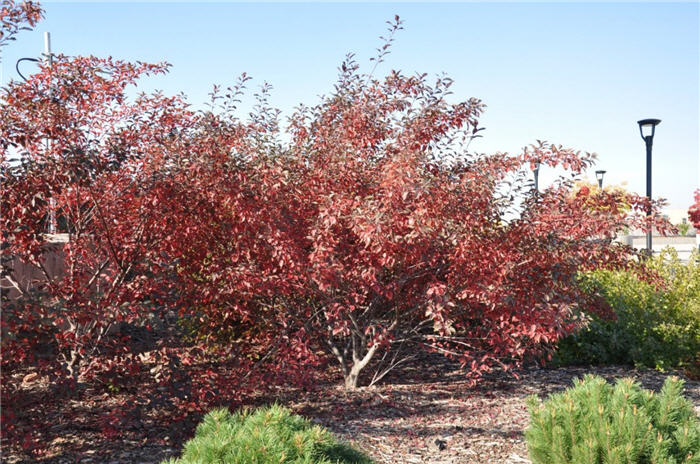| Botanical Name: Prunus besseyi | |
| Common Name: Sand Cherry, Western Sand Cherry |

-
Anatomy
-
Culture
-
Design
Plant Type
Shrub
Height Range
3-6'
Flower Color
White
Flower Season
Spring
Leaf Color
Grey Green
Bark Color
Brown, Red
Fruit Color
Black, Red
Fruit Season
Summer
Sun
Full, Half
Water
Low
Growth Rate
Moderate
Soil Type
Sandy, Clay, Loam
Soil Condition
Average, Rich, Poor, Well-drained, Dry
Soil pH
Neutral, Basic
Adverse Factors
n/a
Design Styles
Mediterranean, Ranch, Spanish
Accenting Features
Fall Color, Showy Flowers
Seasonal Interest
Spring, Summer, Fall
Location Uses
Perennial Border, Shrub Border, Foundation, Patio, Raised Planter
Special Uses
Hedge, Mass Planting, Small Spaces
Attracts Wildlife
Birds
Information by: Stephanie Duer
Photographer: Mountain States Nursery
Photographer: Mountain States Nursery
-
Description
-
Notes
Western sand cherry is a great addition to the landscape, as it's attractive, water-thrifty, and produces tasty edible fruit. A medium-small shrub, growing to 4 to 5 feet tall and maybe a little wider, it has silvery-green foliage that turns red in the fall, and attractive white blossoms that appear in the spring. A multi-purpose plant, many gardeners select this for use as wildlife food and habitat as well. This is a wonderful, low-maintenance fruiting shrub, especially given the resurgence in interest in home food production.
Grow in full sun and well drained soil. Adaptive to soil type and pH. It can be trimmed to a smaller size though it flowers and bears best when allowed to grow to its full size. Space plants 3 to 4 feet apart at planting. It is self-fruitful, though fruit production will be best if you have at least two plants. Hardy to -30F. Tolerates hot and dry conditions.